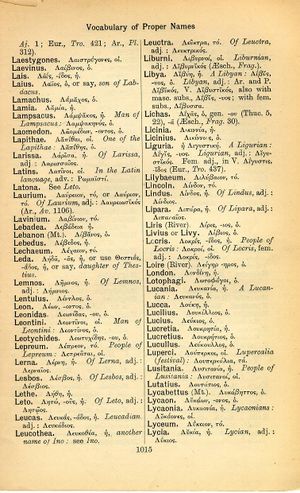Lais
ἀρχὴν μὲν μὴ φῦναι ἐπιχθονίοισιν ἄριστον· φύντα δ' ὅμως ὤκιστα πύλας Ἀίδαο περῆσαι → First, it is best for mortals to not be born. If born, to pass through Hades' gates as soon as possible.
English > Greek (Woodhouse)
Λαΐς, -ΐδος, ἡ.
Latin > English (Lewis & Short)
Lāïs: ĭdis and ĭdos, f., = Λας,
I the name of two courtesans of Corinth celebrated for their beauty.
I Lais, who flourished during the Peloponnesian war: dicitur et multis Lais amata viris, Ov. Am. 1, 5, 12; Cic. Fam. 9, 26, 2 (acc. Laida); Prop. 2, 6, 1 (gen. Laidos).—
II Lais, a contemporary of Demosthenes, Gell. 1, 8, 3 sqq.; Plin. 28, 7, 23, § 81.—Acc. plur.: Laidas et Glyceras, lascivae nomina famae, Aus. Epigr. 18, 1.
Latin > French (Gaffiot 2016)
Lāis,¹⁵ ĭdis ou ĭdŏs, f. (Λαΐς), deux célèbres courtisanes de Corinthe : a) au temps de la guerre du Péloponnèse : Cic. Fam. 9, 26, 2 ; Ov. Am. 1, 5, 12 ; Prop. 2, 6, 1 ; b) contemporaine de Démosthène : Gell. 1, 8, 3 ; Plin. 28, 81.

